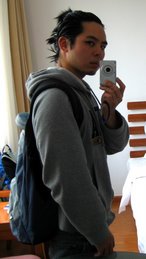Today in my SAT class somehow we found ourselves afloat in the sea of the Imus controversy. I'm not exactly sure how we ended up there, but knowing how way leads on to way, we were unable to 'come back' to the principals of writing for quite some time...
Curious to aggregate my students' opinions on the whole affair (or at least on certain particulars), I asked whether they considered the whole brouhaha much ado about nothing, an offense to both minority groups and women alike, or something in between. Several indicated that in the circles in which they travel, racial epithets are often terms of endearment, and when they are not, it's best to shrug them off rather than endow them with more power by making a fuss. [Just in case it wasn't clear, here's my indemnification: these are high school students, the opinions of whom I am neither officially endorsing nor repudiating. I'm just passing along a very small (and possibly unrepresentative) sample of their collective psyche. If you have objections—or kudos—I'm a messenger who can pass those along, but one who will by no means stand to be the final recipient of either sentiment.]
One student, Mr. Michael Ahn, commented that "if adults knew the things kids say in schools, they would go crazy," presumably because he considered the Imus comment relatively harmless in comparison to the daily regimen of political incorrectness to which students find themselves exposed. And this revelation brought to mind a sentiment I recently came across in David Foster Wallace's Consider the Lobster.
In one of the essays comprising that devilishly and delightfully clever book, Wallace points out that political correctness, for all its current fashionability, simply obfuscates the real problems of racism, sexism, classicism, et al, by cloaking them in acceptable terminology. As a society, Wallace asserts, we have been duped into believing that using the language of inclusivity and acceptance equates with adopting those values. Rather than promoting tolerance, this parlance of the socially polite has allowed discrimination and hatred not only to remain extant, but to thrive under the disguise of politically correct verbiage.
It would not, I feel, be too far of a stretch to believe Mr. Wallace might assert that contrary to the public upbraiding Imus received, he is due our gratitude for his clear and unequivocal use of terms deemed too vulgar for use in polite company. Though his bigotry is not to be condoned, much less endorsed, I can't help but surmise there are at least a few out there who appreciate the way his unveiled contempt has brought a real social problem out of the shadows and into public scrutiny.
Subscribe to:
Post Comments (Atom)

No comments:
Post a Comment